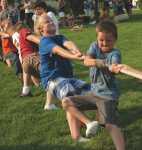Cultural celebration

Hundreds of people made the annual trek to Mountain Home to relive the culture and language of the Basque people during a yearly event held in a small park on the city's west side.
The 52nd Annual Basque Picnic on Saturday is often the one day out of the year where these people can get together and enjoy a special friendship forged by tradition.
Each year, dozens of members from the Euskal Lagunak organization come together to plan and run the festival. These representatives include Basques from Elmore, Owyhee and Ada counties.

Originally held in Carl Miller Park, local Basques plan the yearly celebrations around the birthday of St. San Ignacio, the patron saint of Basques.
This year's event forged some new traditions that started with a Catholic Mass early in the afternoon. It was something people like Richard Urquidi had worked for years to include during the picnic. It was a good way for things to begin -- a special occasion for a beautiful day, Urquidi said.
The unseasonably hot temperatures didn't deter people from attending, said Erin Acarreguii, a spokesperson with this year's event. Over the past 52 years, history has shown that people will always attend these picnics regardless of the weather.

"Even as warm as it is, things are going really well," she said.
This year's festival featured some changes to its traditional ethnic feast, which includes lamb, rice and red beans. During the afternoon, people had the option of ordering meal items a la carte versus buying the entire plate.
Changing up the menu was a welcome change for many people, according to Acarreguii.
"We've actually been much busier this year, even with the heat," she said.
In the past, people wanted to order the dinner but some would decide against it because they didn't want the lamb or something else on the menu, Acarreguii said.
"The fact that people can have a variety of food has definitely been very popular," she added. "The change was good."
During the evening, people also sampled cuisine like chorizo -- a deep-fried sausage. Marianne Bate had already served up 150 of the traditional Basque treats by 5 p.m. with plenty of people waiting in line to order more.
"We'll be cooking them all night," said Marianne Bate as she checked on another batch cooking behind the food tent.
As a way to pass along the Basque culture to their children, organizers hosted a series of games for these youngsters. The younger ones dashed back and forth during a series of races while others bounced to the finish line in the sack race while boys and girls vied for dominance in a tug-of-war.
In addition to earning ribbons, competitors like Mossimo Macmillan walked away with $1 coins for winning these contests.
Meanwhile, older contestants put their pride on the line during the Txinga, or Basque weight carrying, competition. Geared for teens and adults, the strongman event required people like Dale Knox to haul sets of weights over a preset course with scores based on how far people could tote this weight before dropping them. The teen walked away with $75 in cash -- as well as yearly bragging rights -- after he hauled a pair of 55-pound hand weights over a total distance of 986, six inches before they slipped out of his hand.
This year's picnic came just days after seven Basque children from Mountain Home attended a two-week cultural event in Boise. Among those participating in the Udalek, or summer camp, was Shaleah Lasuen. Her grandparents are first-generation Basques.
"At first, I really wanted to go, but I got a little scared right before I went," Lasuen said. "But once we got started, I learned that I really liked it."
Held at the state Basque center, the participants got a first-hand look at their ethnic culture and language to musical instruments and games unique to their heritage.
"It was all interesting because it was all new to me," Lasuen said.
The love of the Basque culture took center stage Saturday evening during a performance by the Oinkari Dantza Taldea. The Boise-based dance group helped people relive many of the Basque traditions from their native homeland.
Among these dances was the Lapurdiko Makil, or stick dance, which involves moves where dancers smack together short wooden staffs. Local Basques believe these moves reflect times when people beat sticks together to ward off evil spirits.
However, the Ikurriņa, or flag dance, remained the one with most significance for local Basques. The audience applauded and cheered as a member of the dance team waved the Basque flag above other members of the dance troupe as they bowed in reverence to their native homeland.
According to members of the dance troupe, the Ikurriņa remains an important symbol of the Basque people. For years, this dance was banned in their native country as Spanish dictator Francisco Franco tried to suppress their culture, they said.
Home to one of the world's oldest democracies, the Basques include approximately 3 million people living in a region about the size of Rhode Island nestled between France and Spain.
The first Basques immigrated to the United States around 1860 and became the first people to fish for cod off the Grand Banks of New Foundland with others settling in places like California. Economic woes in their homeland prompted many more to come to America between 1890 and 1900 with the first Basques coming to Mountain Home around 1910, the Basque historian said.
For years, local Basques made their living herding sheep and cows with some of the original ranching buildings still standing in Mountain Home.
